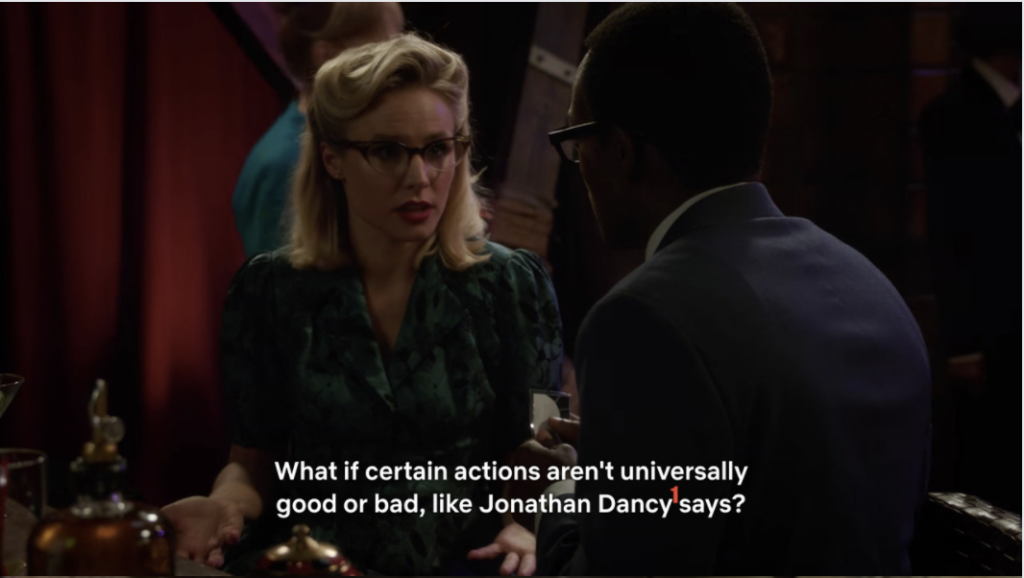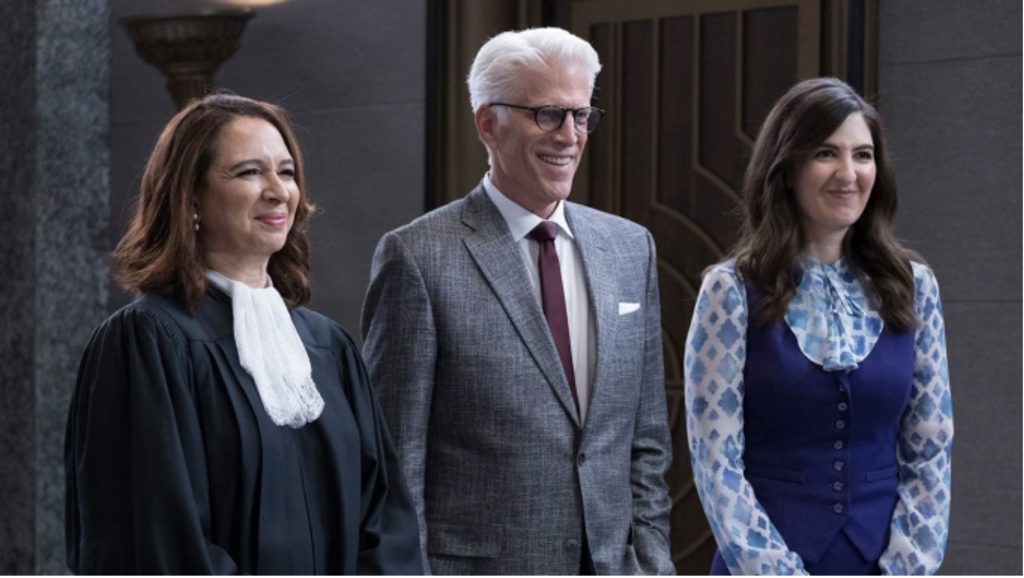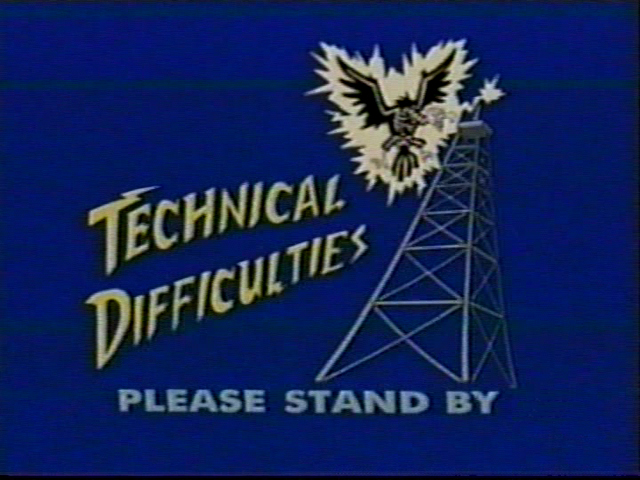Please join us this Monday, Nov. 15, from 4:30 to 5:30pm to discuss episodes 10 “Rhonda, Diane, Jake, and Trent” and 12 “Somewhere Else” of the Good Place, Season 2. We’ll meet in the Strange Lounge of Main Hall.

Episode 10 “Rhonda, Diane, Jake, and Trent” With Michael and Janet’s help, the crew has snuck into the bad place in the hopes of gaining access to the neutral zone to plead their case to the judge. Unfortunately, they get caught in the middle of a cocktail party celebrating the perceived success of Michael’s fake neighborhood, and must lie to avoid being discovered. Unsurprisingly, Chidi is having trouble with this. Eleanor responds to Chidi by invoking moral particularism.
Chidi: “Hey! Hi! So, those road(?) demons over there think I’m some kind of great torturer and they want my advice on how to torture someone. Jason is stalling by ranking MMA ring girls with them but I have to do something. And Eleanor, you’re wearing glasses now. Help me!”
Eleanor: “You know the answer, dude. Lie your ass off!
…
Eleanor: “What if lying is ethical in this situation. What if certain actions aren’t universally good or bad, like Jonathan Dancy says.”
Chidi: “Jonathan Dancy? Are you talking about moral particularism? We never even covered that. You read on your own?!”
Eleanor: “You think that just because I’m a straight hottie I can’t read philosophy for fun? Look, moral particularism says there are no fixed rules that work in every situation. Like, let’s say you promised your friend you’d go to the movies. But then, your mom suddenly gets rushed to the ER. Your boy Kant would say, ‘Never break a promise. Go see Chronicles of Riddick. It doesn’t matter if your mom gets lonely and steals a bucket of Vicodin from the nurses’ closet.’”
Chidi: “Real example?”
Eleanor: “Yep. But a moral particularist…like me. I’m one now. I just decided. …would say, ‘There’s no absolute rule. You have to choose your actions based on the particular situation.’ And right now we are in a pretty bonkers situation.”
What do you think of moral particularism? There are at least two ways we can understand the claim that general moral principles do important ethical work—the idea which the moral particularist rejects. First, moral principles can be understood to help explain why particular actions are right or wrong. So, for example, Chidi’s lie that he is a great torturer would be wrong because it is incompatible with some general moral principle like Kant’s categorical imperative. Second, moral principles can be understood as guides that help us figure out what we should and shouldn’t do. On this conception, Chidi can figure out that he shouldn’t say that he’s a great torturer by noting that it is incompatible with the categorical imperative. There is a third way to understand the claim that moral principles do important ethical work: that they do both of these things. What does the moral particularist lose on each of these conceptions of moral principles? Does the moral particularist have anything to put in the place of moral principles? Can the moral particularist explain why a particular right action is right without appealing to moral principles? Do they even need to do so? Why should we think that there is an explanation for such a thing? And how are we to go about figuring out what is right or wrong if there are no general moral principles that say, about all, or at least wide classes, of actions, that they are right or wrong (as the case may be)?

Episode 12 “Somewhere Else” The crew successfully reaches the judge, and the judge agrees to give them tests, which will determine whether they belong in the good place or the bad place. Everyone except Eleanor fails, and so they must all get sent to the bad place. Eleanor doesn’t think that’s fair, and in response, the judge says,
“I still believe that the only reason you improved in Michael’s fake neighborhood is because you thought there was a reward at the end of the rainbow. You’re supposed to do good things because you’re good, not because you’re seeking moral desert.”
What do you think of the judge’s claims? Concerning the first, do you think that the four protagonists improved only because they thought they were going to get rewarded if they did? In Eleanor’s case, it seems her (at least initial) motivation was to improve to the degree that, if she had been that good on earth, she would have deserved to have been sent to the good place. This doesn’t really seem like merely seeking moral desert to me since it’s all after the fact.
What about the second sentence? First of all, is there a difference between the two ways ‘because’ is being used in the last sentence? The first sounds like an external explanation, i.e., an explanation someone else might give when explaining the person’s behavior without appealing to their internal mental states. The latter, on the other hand, sounds like an internal explanation, i.e., one that that person might represent to herself in order to motivate herself to do a good thing. But perhaps we can fix up the judge’s claim, e.g.
“You’re supposed to do good things because they’re good, not because you’re seeking moral desert.”
Or
“You’re supposed to do good things because they’re the right thing to do, not because you’re seeking moral desert.”
What do you make of these claims? Can someone be moral doing the right thing only because they’re seeking a reward of some kind? Can they even successfully do a good thing when they do something only because they’re seeking a reward of some kind? The first question concerns the nature of the person’s character, while the second concerns the nature of their act.

